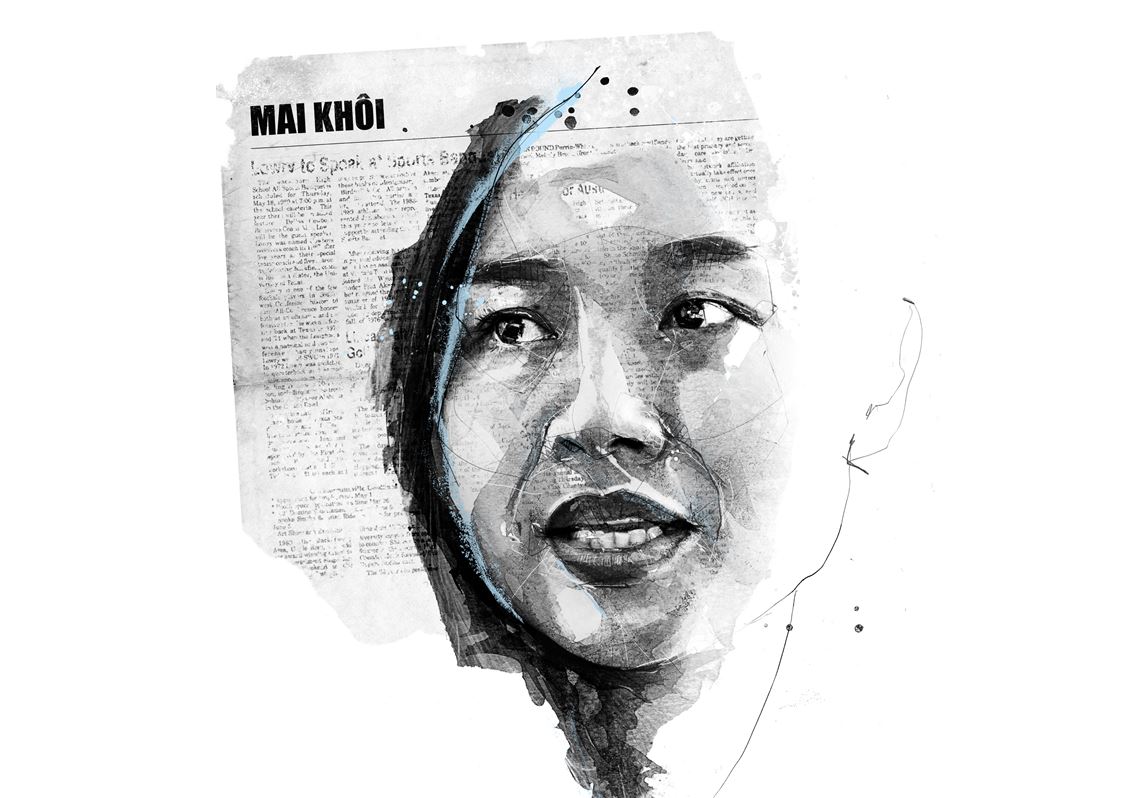When Mai Khoi was growing up in the early 1980s, her family, like many families in Vietnam after the American war ended, was too poor to own a piano. And so her father, a pianist and guitarist, handed down his gift of music the only way he could: He drew piano keys on a cardboard box and taught his daughter to sing each note
Mai Khoi’s father was a rebel who wore bell-bottom pants, which were too Western, and therefore too decadent, for Vietnam’s police-state overlords. More dangerously, he joked and sang unflattering songs about the late Communist leader Ho Chi Minh. Unflattering songs about “Uncle Ho” were forbidden, even long after his death in 1969. That’s how Mai Khoi’s father handed down something else to his daughter: his defiant spirit.
Her father ended up in prison, which the Vietnamese regime called a re-education camp. When he came home, Mai Khoi says, he was not the same: “No more bell bottoms. No more making fun of Ho Chi Minh.”
While her father’s spirit may have been broken, his daughter’s blossomed.
Years later, Mai Khoi became a pop star. She played arena concerts and in 2010 won Vietnam’s equivalent of the Grammy for best song. Often called Vietnam’s Lady Gaga, she leveraged her art and fame to push back against Vietnam’s repressive regime.
Mai Khoi joined and led protests. In 2016, she ran as an independent candidate for the Communist-run National Assembly, although officials would not allow her name to appear on the ballot. She dared to invite President Barack Obama to meet with civic activists during his May 2016 visit to Vietnam. And he did, further angering Vietnamese leaders.
Like her father, Mai Khoi sang protest songs, but by the mid-2010s she could perform only for underground audiences. She and her former band, Mai Khoi & the Dissidents, have often been compared to Russia’s Pussy Riot for their fearless, outspoken opposition to censorship and human-rights abuses.
When Donald Trump visited Vietnam in 2017 to strengthen U.S. defense cooperation with the Vietnamese regime, Mai Khoi welcomed his motorcade with an obscene sign.
Two years later, in 2019, she left Vietnam in fear for her safety.
“It was dangerous,” Mai Khoi says now. “People around me, people who loved me, were afraid for me. But I felt I had something to do and so I did it. I have a voice, and so I use it.”
Mai Khoi, 38, now lives in exile in Pittsburgh, having arrived in 2020 with the support of the Artist Protection Fund and hosted by the University of Pittsburgh’s Global Studies Center, the International Free Expression Project (IFEP) and City of Asylum. She has since become a City of Asylum artist-in-residence.
Below, Mai Khoi talks about the growing threat of authoritarianism and why she continues to risk so much to protect the rights of others.
Anyone can be an activist: Mai Khoi in her own words
I was not born an activist. I was a pop star. Looking back now, I think the pop-star life I was living was very wasteful, very useless. I hate to think about it. That kind of life is all about material things. It encourages people not to care about others, not to care about social issues, not to care about lives beyond their own. It encourages people to ignore lives that aren’t so lucky.
Still, as an artist in Vietnam, I felt very uncomfortable working under the censorship system. I wasn’t free to create. And I saw so many injustices in my country. There was a huge gap between the quality of the lives of government officials and those of the citizens.
In 2016, I joined an environmental protest. I saw police pull people off the street and beat them mercilessly, just for speaking out. I felt I had to do something. I thought maybe I could be useful. I thought maybe I could use my fame to help others. I also wanted to protect my own right to be an artist, of course, but more than that, I wanted to protect the people around me. I had so many fans and followers. I felt like together we could make a difference.
Since I was so famous at the time, I thought fame would protect me. I believed if I became an activist, if I started speaking out, it would encourage others to know their rights, fight for their rights and speak out, too.
Everyone said what I was doing was dangerous. After all, I am just a little woman and the government had so much power. But I felt driven to do something to help, and so I did what I could.
In 2016, I nominated myself as an independent candidate for the National Assembly. Since I was so outspoken, people in power saw me as a serious threat. By the end of 2019, I was forced to leave my country. I’d been evicted from my house. I was threatened. I was under surveillance 24/7.
Now I’m free mostly to travel around the world and perform, but it’s still not safe for me to go back to my own country. It makes me very sad.
When I perform “Bad Activist,” I want to raise awareness about human rights in Vietnam and around the world. I hope it will encourage people to support one another and fight together, because democracy everywhere is under attack. The situation is so serious. Just a few weeks ago, Salman Rushdie, a very famous writer, was stabbed on stage while speaking out for freedom of expression. This happened here in the United States. In the United States.
I worry a lot.
Anyone can be an activist. An activist organizes things, helps build movements and fights for values they believe are useful and good. I hope I can encourage people to become activists, or support activists. I hope I can convince people that their voices matter, that speaking out matters.
As for me, I don’t expect anything. I don’t want to be remembered. I don’t need recognition or fame anymore. I just want to do things I think are good for our society. And maybe I can inspire other people to do something good, too, and then it can go on like that.
I try to think of just two things now — the present and the future. The only thing that’s important is what I can do to help.
Lori Jakiela is a writer and professor of English at the University of Pittsburgh at Greensburg. Her work has been published widely, including in the New York Times, Washington Post and Chicago Tribune. Mai Khoi will share her story with a live audience Thursday, Sept. 15, at 7 p.m. at Pittsburgh Playhouse when she premieres a new multimedia production of her one-woman show, “Bad Activist.” Tickets for the performance can be purchased at playhouse.pointpark.edu.
First Published: September 11, 2022, 4:00 a.m.













